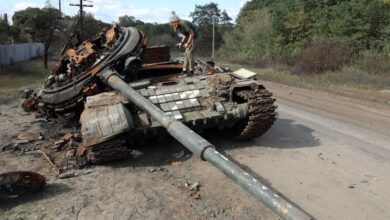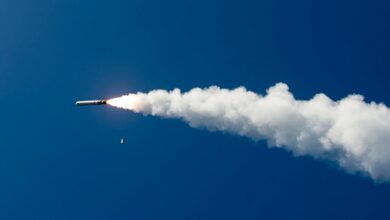One Dead in Rocket Attack on Iraq Base Hosting US Troops
The attack on Ain al-Assad military airport took place at 7:20 am.
At least 10 rockets slammed into a military base in western Iraq hosting US-led coalition troops on Wednesday, security sources said, leaving one civilian contractor dead.
The attack on the sprawling Ain al-Assad base in Iraq’s western desert comes after several weeks of escalating US-Iran tensions on Iraqi soil.
It also comes just two days before the first-ever papal visit to the country by Pope Francis, who said he would still make the visit so as not to “disappoint” the Iraqi people.
Ain al-Assad hosts both Iraqi forces and US-led coalition troops helping fight the Islamic State group, as well as the unmanned drones the coalition uses to surveil jihadist sleeper cells.
Coalition spokesman Colonel Wayne Marotto confirmed that 10 rockets hit the base at 7:20 am (0420 GMT) while Iraqi security forces said they had found the platform from which 10 “Grad-type rockets” hit the Ain al-Assad base.
Western security sources told AFP the rockets were Iranian-made Arash models, which are 122mm artillery rockets and heavier than those seen in similar attacks.
“One civilian contractor died of a heart attack during the attack,” a high-level security source told AFP, adding that he could not confirm the contractor’s nationality.
The death marks the third fatality in rocket attacks in recent weeks, after rockets targeting US-led troops in the Kurdish regional capital of Arbil left two people dead.
Days later, more rockets hit a US military contracting company working north of the capital and the US embassy in Baghdad, but only injuries were reported.
Boiling Tensions
In response, the US carried out an air strike on February 26 against Kataib Hezbollah, an Iranian-backed Iraqi paramilitary force stationed along the Iraqi-Syrian border.
Washington says it struck on the Syrian side of the border but Kataib claims one of its fighters who was killed in the bombardment was protecting “Iraqi territory.”
Analysts have pointed to both domestic and international reasons for the sudden rise in tensions.
Hardline Iraqi groups have an interest in ramping up the pressure on Prime Minister Mustafa al-Kadhemi following his pledges to rein in rogue militias.
They may also carry a message from Tehran to Washington, which under US President Joe Biden is offering to revive the Iran nuclear deal abandoned by his predecessor Donald Trump in 2018.
Iran is demanding the US lift sanctions immediately, while the US wants Iran to move first by returning to previous nuclear commitments.
Tensions between the two rivals peaked in January 2020, following a US drone strike on Baghdad airport that killed Iranian general Qasem Soleimani and top Iraqi paramilitary commander Abu Mahdi al-Muhandis.
In response, Iran launched ballistic missiles on Ain al-Assad and Arbil, wounding dozens.
Iraq ‘waiting for Us’
Over the next 10 months, dozens of rockets and roadside bombs targeted Western security, military, and diplomatic sites across Iraq — some of them deadly.
Iraqi and Western officials have blamed hardline pro-Iran factions, some of which have established “front groups” to avoid being directly accused of violence.
Last year’s attacks came to a near-complete halt in October following a truce with the hardliners, but they have resumed at a quickening pace over the past three weeks.
Despite the recent escalation, Pope Francis is determined to go ahead on Friday with the first-ever papal visit to the country.
“The day after tomorrow, God willing, I will go to Iraq for a three-day pilgrimage. For a long time I have wanted to meet these people who have suffered so much,” the 84-year-old Francis said in his Wednesday address.
He added: “The Iraqi people are waiting for us, they were waiting for Saint John Paul II, who was forbidden to go. One cannot disappoint a people for the second time. Let us pray that this journey will be successful.”
While he is not scheduled to visit western Iraq, Francis will spend time in Baghdad and Arbil, both hit by rocket attacks last month.
Iraq is simultaneously gripped by a second wave of the coronavirus, which is seeing more than 4,500 new cases a day in the country of 40 million.
To stem the spread and control the crowds during the Pope’s visit, Iraq is set to extend its weekend lockdowns to include the entirety of the papal visit from March 5-8.












